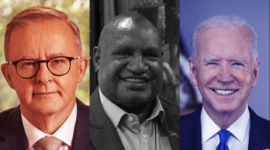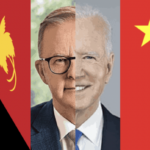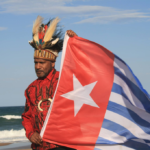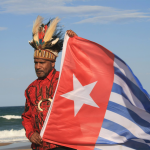PNG Public Service Raises Fears Over Marape Ceding Sovereignty to the US

Increasing disquietude is simmering amongst Papua New Guinea’s public sector, as well as with a growing number of that nation’s intellectuals, as concerns over diplomatic ties Port Moresby is forging with Washington would appear to be triggering further tensions in the Indo Pacific region.
This has been evidenced by a number of anonymous individuals from PNG having contacted this publication and others to express dismay around two security negotiations our Pacific neighbour is currently in the midst of establishing: one with Washington, while the other is with Canberra.
PNG sources were already alarmed about the Australia-PNG bilateral security treaty (BST), due to its words conveying an erosion of sovereignty, while the US-PNG defence cooperation agreement (DCA) simply hands over the keys to local military bases providing the US with unimpeded access.
US president Joe Biden was supposed to attend a meeting of the Quadrilateral security dialogue on 20 May in Sydney, which was cancelled due to a US domestic crisis. This also meant that a stopover in Port Moresby that was to facilitate the signing of several military arrangements was also delayed.
Anthony Blinken, US state secretary, arrived in PNG on 21 May to advance negotiations. This coincided with leaked sections of the defence agreement having been released to media, which clearly outline the ability for a significant US military presence to be established in that country.
Shifting alliances
An anonymous officer from the PNG Ministry of Foreign Affairs got in contact with Sydney Criminal Lawyers last week, stating that whilst PNG has long been establishing a naval venture with Australia on Manus, the latest arrangements with the US were sparked by last year’s Solomon Islands episode.
In mid-April 2022, the Solomons entered into a new security pact with Beijing, and whilst this controversial alignment between these nations has entered into force, an attempt by China to establish a new overarching security relationship with ten other Pacific island nations fell through.
But according to the PNG foreign ministry officer, this arrangement between China and the Solomons had led PNG prime minister James Marape to consider that his nation’s dominance in Melanesia could be threatened by this new security alignment with Beijing.
And this then saw Marape enter into separate treaties with Washington and Canberra. And whilst the White House rapidly carried out its negotiations, which led to the establishment of the defence agreement last month, Australia’s diplomatic arrangements continue to be in the drafting stage.
Indeed, the anonymous source explains that what this reveals is the Marape government is now prioritising its relationship with Washington over that with Canberra, even though Australia is the Melanesian nation’s closest neighbour and long-term partner in the Indo-Pacific region.
Maintaining control
At the time it was announced that Blinken would be attending PNG rather than Biden to sign off on the defence agreement, an anonymous PNG government employee sent copies of screenshots to a number of publications, including the ABC, that purportedly reveal key points of the US-PNG DCA.
Sections of the defence agreement that were released, reveal that the US will be able to establish a substantial military presence in PNG. And whilst joint training is mentioned, so too is the capacity to refuel aircraft that have been conducting reconnaissance and surveillance missions in the area.
According to the PNG foreign affairs source, the Australian-PNG BST was meant to have been finalised in April, but at the request of the US, the Melanesian nation has delayed its finalisation, so Port Moresby could work out the finer details around the White House DCA first.
Washington is also said to have obtained a copy of the Australian BST, which outlines that our nation sought to maintain its position as PNG’s primary security partner, and the US then redrafted some of its DCA, with the aim of rebalancing the security relationships Papua has with its two western partners.
Neocolonial manoeuvres
The 2019 Memorandum of Understanding for the Joint Initiative at Lombrum Naval Base aimed to establish a joint Australian-PNG presence at the military base on Manus Island that sought to increase the interoperability between the defence forces of both nations.
Parts of the DCA leaked last month suggest that the agreement will provide greater access to that base to US officials. And ex-PNG foreign affairs officer Dominic Navue Sengi wrote recently that the Lombrum arrangements are so secretive that PNG ministers are unaware of their implications.
In recognising that these recent developments have warring on China as a central focus, Sengi outlines that whilst the western media has been busy propagating the “China threat”, the coming global conflict is more geared towards Washington countering Beijing’s rising economic dominance.
The PNG journalist further underscored that the clearest example that the US and Australia are attempting to militarily encroach upon PNG’s territorial jurisdiction is contained within the provision of the document that establishes a joint presence at the Lombrum base on Manus Island.
The colonisers become colonised
The encroachments that the Australian government appears to be attempting to make into PNG sovereignty is learnt behaviour, as to a large extent, it reflects what the United States has been doing in this country over the last decade.
The 2014 Force Posture Agreement permits the US access to dozens of local military bases, and in circumstances where Washington has decided it might upgrade a military base located on Australian soil, the White House maintains complete control over that facility during the renovations.
The agreement has also established an ongoing presence of around 2,500 US Marines in the Northern Territory, and the treaty further ensures increasing interoperability between the air forces of both this country and the United States.
And since March, our nation has become thoroughly embroiled in the AUKUS agreement, which will provide the nation with eight nuclear-powered submarines, while, in the meantime, the US and UK are going to establish their own joint rotational submarine presence in WA by 2027.
So, whilst PNG PM Marape holds concerns about our nation attempting to usurp some of his country’s sovereignty, in much the same way, the US is carrying out an ever-increasing amount of similar actions that serve to erode this nation’s autonomy.
Indeed, the source from the PNG foreign affairs office outlines that they and their colleagues believe that Australia is their nation’s longest and closest ally, and they assert that Marape should not be betraying this long-term relationship due to short-term temptations provided by the US.







